- Clone
- B8.2C12 (See other available formats)
- Regulatory Status
- RUO
- Other Names
- T cell immunoglobulin and mucin domain containing protein 3, hepatitis virus cellular receptor 2, CD366
- Isotype
- Rat IgG1, κ
- Ave. Rating
- Submit a Review
- Product Citations
- publications
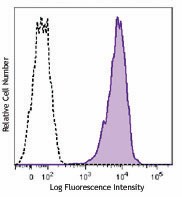
-

Mouse CD366 (Tim-3) transfected cells were stained with anti-mouse CD366 (Tim-3, clone B8.2C12) APC (filled histogram) or rat IgG1, κ APC (open histogram).
| Cat # | Size | Price | Quantity Check Availability | Save | ||
|---|---|---|---|---|---|---|
| 134007 | 25 µg | 82€ | ||||
| 134008 | 100 µg | 233€ | ||||
CD366 (Tim-3) is a transmembrane protein also known as T cell immunoglobulin and mucin domain containing protein-3. Tim-3 is expressed at high levels on Th1 lymphocytes and CD11b+ macrophages. Tim-3 has also been shown to exist as a soluble protein. Cells expressing Tim-3 are present at high levels in the CNS of animals at the onset of experimental autoimmune encephalomyelitis (EAE), a disease mediated by lymphocytes secreting Th1-like cytokines. Tim-3 has been proposed to inhibit Th1-mediated immune responses and promote immunological tolerance.
Product DetailsProduct Details
- Verified Reactivity
- Mouse
- Antibody Type
- Monoclonal
- Host Species
- Rat
- Immunogen
- mTim-3 protein/Freund adjuvant
- Formulation
- Phosphate-buffered solution, pH 7.2, containing 0.09% sodium azide.
- Preparation
- The antibody was purified by affinity chromatography and conjugated with APC under optimal conditions.
- Concentration
- 0.2 mg/ml
- Storage & Handling
- The antibody solution should be stored undiluted between 2°C and 8°C, and protected from prolonged exposure to light. Do not freeze.
- Application
-
FC - Quality tested
- Recommended Usage
-
Each lot of this antibody is quality control tested by immunofluorescent staining with flow cytometric analysis. For flow cytometric staining, the suggested use of this reagent is ≤0.25 µg per million cells in 100 µl volume. It is recommended that the reagent be titrated for optimal performance for each application.
- Excitation Laser
-
Red Laser (633 nm)
- Application Notes
-
Clone B8.2C12 only binds to the BALB/c allele of Tim-3.
- Application References
-
- del Rio ML, et al. 2011. Transpl. Int. 24:501. (FC) PubMed
- Product Citations
-
- RRID
-
AB_2562997 (BioLegend Cat. No. 134007)
AB_2562998 (BioLegend Cat. No. 134008)
Antigen Details
- Structure
- Transmembrane protein containing immunoglobulin domain and mucin-like domain. It can exist as a soluble form lacking mucin and transmembrane domains.
- Distribution
-
Expressed on activated Th1 lymphocytes, CD11b+ macrophages, and dendritic cells.
- Function
- Play a role in regulating macrophage activation, T cell apoptosis and immune tolerance.
- Ligand/Receptor
- Galectin -9
- Cell Type
- Dendritic cells, Macrophages, Th1
- Biology Area
- Immunology, Inhibitory Molecules
- Molecular Family
- CD Molecules, Immune Checkpoint Receptors
- Antigen References
-
1. Sabatos CA, et al. 2003. Nat. Immunol. 4:1102
2. Kuchroo VK, et al. 2003. Nat. Rev. Immunol. 3:454
3. Mooney L, et al. 2002. Nature. 415:536
4. Rodriguez-Manzanet R, et al. 2009. Immunol. Rev. 229(1):259 - Gene ID
- 171285 View all products for this Gene ID
- UniProt
- View information about CD366 on UniProt.org
Related Pages & Pathways
Pages
Other Formats
View All CD366 Reagents Request Custom Conjugation| Description | Clone | Applications |
|---|---|---|
| Purified anti-mouse CD366 (Tim-3) | B8.2C12 | FC |
| PE anti-mouse CD366 (Tim-3) | B8.2C12 | FC |
| Alexa Fluor® 647 anti-mouse CD366 (Tim-3) | B8.2C12 | FC |
| APC anti-mouse CD366 (Tim-3) | B8.2C12 | FC |
| PE/Cyanine7 anti-mouse CD366 (Tim-3) | B8.2C12 | FC |
| PE/Dazzle™ 594 anti-mouse CD366 (Tim-3) | B8.2C12 | FC |
| PerCP/Cyanine5.5 anti-mouse CD366 (Tim-3) | B8.2C12 | FC |
| Biotin anti-mouse CD366 (Tim-3) | B8.2C12 | FC |
| APC/Fire™ 750 anti-mouse CD366 (Tim-3) | B8.2C12 | FC |
| Brilliant Violet 421™ anti-mouse CD366 (Tim-3) | B8.2C12 | FC |
| Brilliant Violet 711™ anti-mouse CD366 (Tim-3) Antibody | B8.2C12 | FC |
Customers Also Purchased
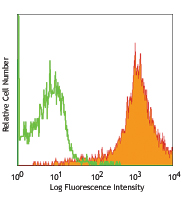
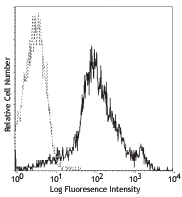
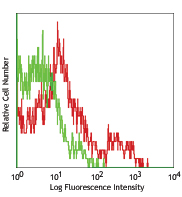
Compare Data Across All Formats
This data display is provided for general comparisons between formats.
Your actual data may vary due to variations in samples, target cells, instruments and their settings, staining conditions, and other factors.
If you need assistance with selecting the best format contact our expert technical support team.
-
Purified anti-mouse CD366 (Tim-3)
-
PE anti-mouse CD366 (Tim-3)
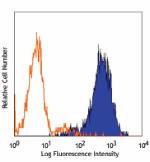
Mouse CD366 (Tim-3) transfected cells stained with anti-mous... -
Alexa Fluor® 647 anti-mouse CD366 (Tim-3)
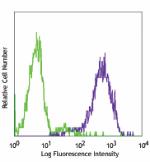
Mouse CD366 (Tim-3) transfected cells stained with anti-mous... -
APC anti-mouse CD366 (Tim-3)
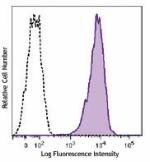
Mouse CD366 (Tim-3) transfected cells were stained with anti... -
PE/Cyanine7 anti-mouse CD366 (Tim-3)
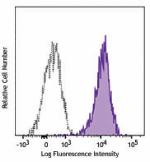
Mouse CD366 transfected cells stained with CD366 (clone B8.2... -
PE/Dazzle™ 594 anti-mouse CD366 (Tim-3)
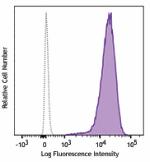
Mouse CD366 (Tim-3) transfected cells were stained with CD36... -
PerCP/Cyanine5.5 anti-mouse CD366 (Tim-3)
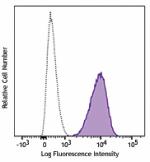
Mouse CD366 (Tim-3) transfected cells were stained with CD36... -
Biotin anti-mouse CD366 (Tim-3)
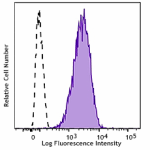
Mouse Tim-3 transfected cells were stained with biotinylated... -
APC/Fire™ 750 anti-mouse CD366 (Tim-3)
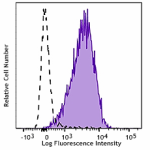
Mouse CD366 (Tim-3) transfected cells were stained with CD36... -
Brilliant Violet 421™ anti-mouse CD366 (Tim-3)
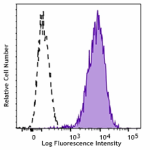
Mouse CD366 (Tim-3) transfected cells were stained with anti... -
Brilliant Violet 711™ anti-mouse CD366 (Tim-3) Antibody
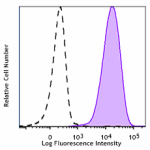
Mouse CD366 (Tim-3) transfected cells were stained with anti...
 Login / Register
Login / Register 










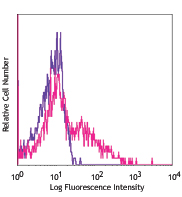



Follow Us